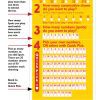Poker is more than just a game of luck–it’s a game of skill, strategy, and psychology. But how exactly is poker a game of skill? Let’s delve into the intricacies of this popular card game and discover what sets it apart from chance-based games.
In poker, players must make decisions based on incomplete information, using their knowledge of the game and their opponents’ behavior to gain an advantage. It’s like a mental game of chess, where every move matters and every decision counts.
Mastering poker requires a deep understanding of probabilities, hand rankings, and the ability to read and bluff opponents. It’s a game that tests your analytical skills, adaptability, and emotional control. So, get ready to shuffle the deck and let’s explore why poker is truly a game of skill.

Why Poker is More Than Just a Game of Luck
Poker, often associated with smoky casinos and high-stakes gambling, is a game that has captivated millions of people around the world. While it may seem like a game of chance, poker is actually a game of skill that requires strategic thinking, mathematical calculations, and psychological prowess. In this article, we will explore how poker goes beyond mere luck and why it has become a favorite pastime for enthusiasts and professionals alike.
The Importance of Strategy in Poker
When it comes to poker, strategy is everything. While luck plays a role in the cards you are dealt, it is how you play those cards that ultimately determines your success. Skilled poker players develop a variety of strategies to maximize their chances of winning. They analyze the odds, evaluate their opponents’ behaviors, and make calculated decisions based on the information available. From understanding the importance of position at the table to knowing when to bluff or fold, a strategic approach is essential in poker.
The concept of expected value (EV) is central to poker strategy. EV is a mathematical calculation that measures the average outcome of a decision over the long run. Skilled players make decisions that have a positive EV, maximizing their expected winnings. This involves calculating the odds of various outcomes and making decisions that are statistically advantageous.
Psychology and the Art of the Bluff
One of the aspects that sets poker apart from other card games is the psychological element involved. Skilled players not only have to consider the strength of their hand, but they also need to be aware of their opponents’ mental states and emotions. The art of the bluff is a fundamental skill in poker, where players intentionally deceive their opponents into thinking they have a stronger or weaker hand than they actually do.
Understanding human psychology, reading body language, and analyzing betting patterns are all part of a poker player’s skill set. By mastering these techniques, players can gain an advantage by manipulating their opponents’ decisions. This combination of strategy and psychology makes poker a game that goes beyond simple luck.
The Role of Mathematics in Poker
While psychology and strategy are vital components of poker, mathematics also plays a significant role. Calculating probabilities and odds is essential in making informed decisions at the poker table. Skilled players use mathematical calculations to determine the likelihood of certain card combinations appearing, the probability of winning a hand, and the potential value of bets.
Understanding pot odds, implied odds, and expected value calculations allow players to make smarter decisions based on the potential value of their hands. By assessing the risk and reward ratio, players can make more informed choices, giving them an edge over opponents who rely solely on luck.
The Professional Poker Circuit: A Showcase of Skill
The professional poker circuit is a testament to the skill and expertise required to excel in the game. Players like Phil Ivey, Daniel Negreanu, and Phil Hellmuth have not only amassed significant winnings but have also earned the respect of their peers for their exceptional abilities.
The World Series of Poker (WSOP), the most prestigious tournament in the poker world, attracts the best players from around the globe. These professionals showcase their skill and strategy, proving that poker is far more than just a game of chance. The consistent success of certain players over time demonstrates that skill plays a crucial role in poker, and luck alone is not enough to consistently win at the highest level.
Benefits of Playing Poker
Playing poker offers a range of benefits beyond the thrill of the game. Whether you play for fun with friends or aspire to become a professional player, poker can enhance various aspects of your life. Let’s explore some of the benefits of playing poker.
Improves Decision-Making Skills
Poker requires players to make quick decisions based on limited information and uncertainty. By constantly evaluating risks and rewards, players develop their decision-making abilities. This skill can be applied to various real-life situations, such as business negotiations or personal choices, where calculated decisions can make a significant impact.
Enhances Mathematical and Analytical Thinking
As mentioned earlier, mathematics plays a crucial role in poker. By constantly calculating probabilities, odds, and expected values, players sharpen their mathematical and analytical skills. The ability to analyze complex situations and make logical deductions can be beneficial in many areas of life, including problem-solving and critical thinking.
Develops Emotional Intelligence
Understanding and managing emotions is a key aspect of playing poker. Whether it’s controlling your own emotions or reading your opponents’ tells, poker hones your emotional intelligence. This skill can improve your ability to navigate social interactions, make better decisions under pressure, and have a deeper understanding of human behavior.
Enhances Memory and Focus
In poker, players need to remember various details, such as the cards that have been played, betting patterns, and the behavior of their opponents. This constant mental exercise helps improve memory and cognitive function. Additionally, the game requires focused attention, as even a momentary lapse can lead to missed opportunities or costly mistakes.
Fosters Social Interaction and Networking
Poker is a social game that brings people together. Whether it’s a friendly home game or a professional tournament, playing poker allows for social interaction and networking opportunities. It provides a platform to meet new people, learn from experienced players, and build connections that can extend beyond the poker table.
Promotes Emotional Resilience
Poker can be a roller coaster of emotions, with players experiencing both highs and lows throughout a game or tournament. The ability to bounce back from losses, maintain composure during winning streaks, and remain focused despite adversity builds emotional resilience. This skill can be valuable in dealing with challenges and setbacks in other areas of life.
Tips for Improving Your Poker Skills
Whether you’re a beginner or an experienced player, there’s always room for improvement in poker. Here are some tips to help you enhance your poker skills:
Study the Game
Take the time to study poker strategy books, watch instructional videos, and analyze the play of skilled players. Understanding the nuances of the game, from hand rankings to advanced betting strategies, is essential in becoming a better player.
Practice Regularly
The more you play, the more you learn. Practice regularly to refine your skills and gain experience. Utilize online poker platforms or join local poker groups to get more playing time and exposure to different playing styles.
Review Your Hands
After each session, review your hands to identify areas where you could have made better decisions. Analyze your play, identify leaks in your strategy, and learn from your mistakes. This self-reflection can be invaluable in improving your game.
Manage Your Bankroll
Proper bankroll management is crucial in poker. Set aside a specific amount of money for playing and stick to it. Avoid playing with money you can’t afford to lose and ensure that your bankroll can withstand the inevitable swings of the game.
Stay Mentally and Physically Balanced
Poker requires mental focus and stamina. Take care of your mental and physical well-being to perform at your best. Get enough rest, exercise regularly, and maintain a balanced lifestyle to keep your mind sharp and focused during gameplay.
Seek Feedback and Learn from Others
Don’t be afraid to seek feedback and guidance from more experienced players. Engage in discussions with fellow poker enthusiasts, join online forums, and participate in study groups to learn from others’ experiences and insights.
Play Mindfully
Stay present and focused during each hand. Avoid distractions and make conscious decisions based on the information available. By playing mindfully, you can avoid making impulsive or irrational choices that can lead to unnecessary losses.
In conclusion, poker is far from being just a game of luck. It requires a combination of strategy, mathematics, psychology, and emotional intelligence. Skilled players excel by making calculated decisions, utilizing their knowledge of probabilities and odds, and analyzing their opponents’ behaviors. Beyond the thrill of the game, playing poker offers various benefits, such as improving decision-making skills, enhancing analytical thinking, and fostering social interaction. By following tips to improve your skills and consistently practicing, you can elevate your poker game and enjoy the challenges and rewards it brings.
Key Takeaways: How is Poker a Game of Skill?
- Poker requires strategic thinking and decision-making skills.
- Players must analyze probabilities and make calculated bets.
- Observing opponents’ behavior and body language is crucial in poker.
- Bluffing and deception are common tactics used in the game.
- A strong understanding of mathematics can give players an edge in poker.
Frequently Asked Questions
Curious about why poker is considered a game of skill? Here are some common questions and answers to help you understand.
1. How do skills factor into playing poker?
While luck plays a role in individual hands, skilled players consistently make better decisions over time. They study the game, understand probabilities, and use strategies to gain an edge. Skilled poker players know when to bluff, how to read opponents, and when to fold. These skills give them a higher chance of winning in the long run.
Good poker players have a firm grasp on mathematics. They calculate odds on the fly, making quick decisions based on probabilities. They know how to analyze their opponents’ betting patterns and make informed judgments about their hands. By utilizing these skills, they can maximize their winning potential.
2. Can anyone become skilled at poker?
Yes! While some people might have a natural affinity for the game, anyone can become skilled at poker with dedicated practice. It’s not just about playing frequently—improvement comes from actively studying and analyzing the game. By reviewing hands, reading books, and discussing strategies with others, you can develop the skills needed to succeed.
Poker is a game that rewards discipline, critical thinking, and adaptability. With time and effort, anyone can become a skilled poker player. Keep in mind that it’s not about winning every hand, but rather making consistently profitable decisions in the long run.
3. How does skill mitigate the role of luck in poker?
While luck can determine the outcome of individual hands, skill mitigates its impact over a large number of hands. Skilled players know how to make the best decisions with the information available, even when luck is not on their side. They manage their bankroll wisely, play strategically, and stay focused on the long-term goal of profitability.
In poker, it’s important to embrace the element of uncertainty and variance. Skilled players understand that even the best hands can lose, and the worst hands can win. However, over time, skillful decision-making prevails, and players who consistently make superior choices will come out ahead.
4. Is there evidence to support poker as a game of skill?
Yes, there is significant evidence supporting poker as a game of skill. Numerous studies have been conducted by universities, researchers, and professional players, all reaching the same conclusion: skill is the primary determinant of success in poker. Skilled players consistently outperform those who rely solely on luck.
Additionally, the existence of professional poker players and poker tournaments further affirm poker’s status as a game of skill. Professionals dedicate their lives to mastering the game and earning a living from it. Their success is a testament to the skill required to succeed in poker.
5. Can poker skills be applied to other areas?
Absolutely! Many skills developed in poker are transferable to various aspects of life. Poker teaches critical thinking, discipline, emotional control, and risk assessment. These skills can be useful in decision-making, negotiation, and even financial management. Poker players often develop a keen sense of reading people, which can be advantageous in social interactions.
Furthermore, the mathematical calculations and probability assessments used in poker can improve analytical skills and logical thinking. These cognitive abilities can be applied to fields such as finance, computer science, or even everyday problem-solving. So, the skills honed at the poker table can have a positive influence on other areas of life beyond the game itself.
Dont Play Poker Before Watching This | Is Poker Skill or Just Luck?
Summary
So, is poker a game of skill? Yes, it is! While luck plays a part, skill is crucial.
Players use strategies, make calculated decisions, and read their opponents to succeed. It’s not just about the cards you’re dealt, but how you play them that matters.
Poker requires practice, patience, and a solid understanding of the game’s mechanics. With time and dedication, anyone can improve their skills and become a formidable poker player.









